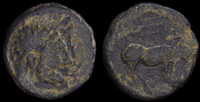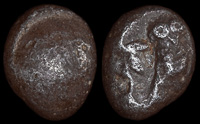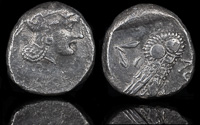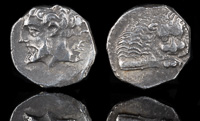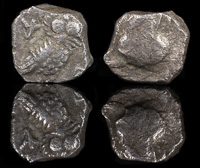Ancient Judea and Area
Foundation of Tell es-Sakan, which later became known as Gaza.
Local Canaanite population resettles Tell as-Sakan, later known as Gaza.
Total collapse of civilization at Gaza.
A new city is built at Tell as-Sakan, later known as Gaza.
Tell as-Sakan, later known as Gaza, is destroyed as Hyksos of Egypt is routed. The area comes under Egyptian rule.
Gaza is occupied by Philistines and is no longer under Egyptian control.
The Israelites under King David occupy Gaza.
Omri defeats the usurper Zimri and becomes king of Israel, with its capital at Samaria.
Samaria becomes the capital of the Kingdom of Israel.
Approximate construction of the first palace at Samaria.
Ahab, son of Omri, becomes king of Israel, with its capital at Samaria.
Death of the unpopular king Ahab. His son Ahaziah takes the throne in Samaria and continues his ways.
Ahaziah dies in Samaria after falling from a roof. Jehoram becomes king of Israel.
Jehoram dies from an arrow wound. Jehu becomes king of Israel, with its capital at Samaria.
Death of Jehu in Samaria. His son Jehoahaz becomes King of Israel.
Death of Jehoahaz, King of Israel. Jehoash takes the throne in Samaria.
Death of Jehoash. Jeroboam II becomes king at Samaria.
A major earthquake damages Samaria.
Death of Jeroboam II at Samaria. Zechariah becomes King of Israel.
Zechariah rules for six months before Shallum kills him and takes the throne in Samaria.
Shallum is executed by Menahem, who takes the throne at Samaria.
King Kaus-malaka is in power in Edom.
Death of Menahem at Samaria. His son Pekahiah becomes King of Israel.
Pekahiah is assassinated by one of his chief military officers, Pekah, who takes the throne in Samaria as King of Israel.
Edom becomes a vassal state of the Neo-Assyrian Empire under Tiglath-Pileser III, who expands his control in the Levant, forcing Edom to pay tribute.
Pekah is assassinated by Hoshea, a captain in his army, in Samaria. Hoshea becomes the last King of Israel.
Canaan is conquered by Tiglath-Pileser III and Gaza comes under Assyrian rule.
Samaria is captured by the Neo-Assyrian Empire.
King Aya-ramu is in power in Edom.
King Kaus-gabri is in power in Edom, according to an Assyrian document.
The Babylonian king Nebuchadnezzar II is defeated by Egyptians near Gaza.
Nebuchadnezzar II captures Jerusalem, leading to the Babylonian Captivity of the Jews.
Nebuchadnezzar II again attempts to take Egypt and fails, but does conquer Gaza.
The Persian king Cambyses I is unsuccessful in his attempt to take Gaza.
Approximate date of the founding of Caesaria Maritima by Straton I of Sidon. The original name is Straton’s Tower.
Alexander the Great besieges Gaza for five months before finally taking it. He is badly wounded in the head during the encounter. He resettles the city with Bedouins.
Samaria is destroyed by Alexander III.
June 30
Partition of Babylon. Abydos and Adramytteion come under control of Leonnatos. Egypt with Alexandria and Gaza are under Ptolemy. Baktria comes under Seleukos I Nikator. Asandros obtains Caria. Laomedon receives Koele-Syria.
Edom (by now Idumea) comes under Ptolemaic rule.
Antigonos‘s son, Demetrios I suffers a major defeat at the Battle of Gaza against Ptolemy I and Seleukos I. Peithon is killed.
Demetrios Poliorketes defeated at the Battle of Gaza by Ptolemy I Soter and Seleukos I Nikator.
During the Maccabean Revolt against the Seleukids, tensions increase between the Jewish population and Idumeans, who are caught between the Seleukids and the Hasmoneans.
John Hyrcanus destroys Samaria.
Alexander Jannaios besieges Gaza for a year, then kills all the inhabitants and destroys it.
Straton’s Tower (later named Caesaria Maritima) is captured by the Judean king Alexander Jannaios.
The Romans declare Straton’s Tower (later Caesaria Maritima) a free city.
Gaza incorporated into the Roman Empire and rebuilt by Aulus Gabinius.
Straton’s Tower is given to Herod I, who renamed it to Caesarea Maritima in honor of Augustus.
Herod I begins construction of the harbor at Caesarea Maritima.
Judea, including Edom, becomes a Roman province. Caesarea Maritima replaces Jerusalem as the capital.
Caesareia Maritima undergoes civil disobedience in reaction to Pontius Pilate’s order to place eagle standards on the Temple Mount.
The Jewish Revolt breaks out, supposedly due to merchants in Caesarea Maritima sacrificing birds in front of a local synagogue.
Gaza is burned by Jews during the rebellion against Rome.
The Jewish Revolt is suppressed and games are held at Caesarea Maritima to celebrate Titus‘ victory.
August 30
December
Titus celebrates victory games at Caesarea Maritima.
October
Diocletian orders the tongue of the deacon Romanus of Caesarea removed for interrupting sacrifices.
August 22
The author and his wife visit Jerusalem.
September 6
The author and his wife stop at Caesarea Maritima.
